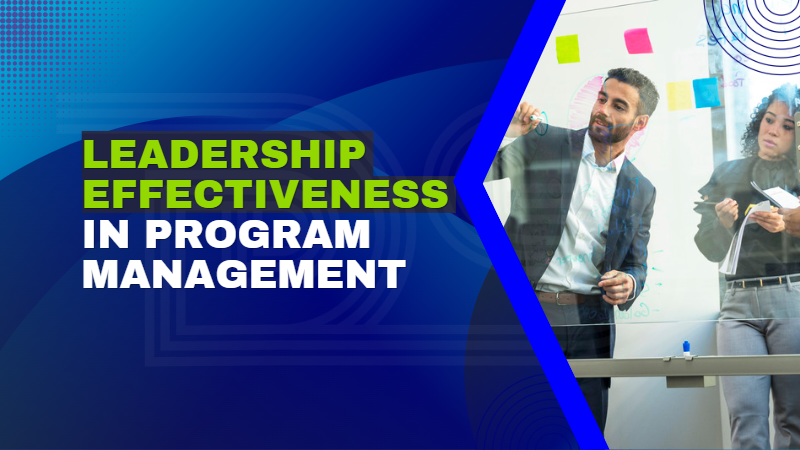
by Dharam CW2 | Mar 15, 2024 | General
Managers who practice both strong management and effective leadership skills are successful project managers. Management skills are different from leadership skills. Effective leaders develop new leadership skills to enhance the ones that help them succeed as managers.
Organizations require effective leaders to achieve their strategic goals through programs and initiatives. Therefore, organizations need successful project/program managers who are also effective leaders. But what kind of leadership skills do project managers require? Are project management skills insufficient?
Project management differs from leadership. However, although project management differs from leadership, the two have some similarities. For instance, the performance of a project manager and the leader’s efficacy are both judged in terms of the performance of the followers—the team’s performance. As a result, focusing on team performance is a critical component of building project managers’ leadership skills.
Leadership Effectiveness

Leadership Effectiveness
On a macro level, leadership effectiveness is defined by a leader’s ability to gain support and influence throughout an organization to guarantee that everyone is going in the same direction to achieve common goals. It effectively measures a leader’s ability to lead, influence, manage, advice, and build their team members. The total growth and performance of the teams may be used to assess leadership effectiveness. Those who report high levels of productivity, performance, employee happiness, and well-being indicate high levels of leadership effectiveness.
A good leader inspires the best in others. These leaders understand how to create the ideal corporate vision, establish the proper values, and assist employees in focusing on and improving their skills. Great leadership reflects great performance, not just complex numbers. Workers and the organization will improve if leaders establish a great corporate culture and help employees thrive.
Program management
According to the Standard of Program Management – Fourth Edition, Program management is “the application of knowledge, skills, and principles to a program to achieve the program objectives and to obtain benefits and control not available by managing program components individually.” Program management involves aligning program components to ensure goals are achieved and benefits are optimally delivered. Program management is performed by a program manager authorized by the organization to lead the team(s) responsible for achieving program goals and objectives.
Ways to improve leadership effectiveness in Program Management

Ways to improve leadership effectiveness in Program Management
- Ensure clarity and visibility of goals
You may begin your path to improve leadership effectiveness in your business by encouraging leaders, managers, and executives to focus on objective clarity and visibility. This move has multiple aspects. First and foremost, the goals must be very clear. As a result, goals must be SMART for effective leadership, and adopting an OKR approach will make sense.
Second, for comprehensive visibility, the goals must be communicated to everybody. On the one hand, everyone in the team has to understand the organization’s goals and their role in attaining them.
- Facilitate accountability and responsibility
Second, exercising accountability and responsibility is critical for leadership success. Encourage your leaders to take accountability for their actions. The goal is to encourage them to be interested in increasing their leadership effectiveness. This aspect requires determining which skills and abilities to be acquired, as well as aspects such as emotional intelligence and empathy. When your leaders seek to improve themselves, they usually set a good example for others to follow, increasing their effectiveness as leaders since they may start a positive trend.
- Create a culture of feedback
Leadership effectiveness is heavily influenced by a leader’s desire to improve oneself. It is optional to self-assess the deficiencies and work on upskilling in this situation. Instead, it is critical to foster a feedback culture. First and foremost, it is vital to provide feedback to employees on their performance and to assist them in improving and growing along the way. This move will immediately influence organizational goals and define increased effectiveness.
Second, encourage your leaders to be receptive to employee input as well which will assist them in seeing and comprehending the gaps in their leadership style that may impede their success as a leader. Creating a feedback culture can promote improved outcomes, eventually enhancing leadership effectiveness.
- Build trust and transparency
Trust and openness are required for leaders to influence, direct, and build their teams to success. When employees trust their supervisors or leaders, they will follow them fully and offer their all. If not, following their manager will be a pointless exercise limiting leadership effectiveness.
Similarly, it is critical to be open and honest with all employees. Secrets, nepotism, preferences, and biases will be self-defeating if you want your leaders to inspire everyone collectively. Instead, everyone must be treated equitably, and all processes must be transparent to acquire team trust and influence them.
- Focus on continuous performance management
Effective leadership is not just about motivating and encouraging team members to follow a leader or manager but also about doing so in a way that leads to achieving a certain objective or high level of performance. As a result, boosting leadership effectiveness necessitates emphasizing continuous performance management.
Employees grow and develop when their leaders or managers regularly monitor and track employee performance and give frequent interventions and corrective steps to minimize risks or problems. As a result, they can motivate and inspire their team members, resulting in increased leadership effectiveness.
- Respect differences and promote inclusion
Members of each team come from various backgrounds, bringing with them different perspectives, ideas, and opinions. An effective leader accepts these differences, appreciates them, and recognizes their value. To boost leadership effectiveness, you must cultivate an inclusive culture. In addition, your leaders must understand the important skills and competencies each team member brings to the table and how the multiple views and perspectives offer the ideal breeding environment for creativity and success, resulting in leadership effectiveness.
- Foster a growth mindset
The last recommended practice for increasing leadership effectiveness is cultivating a growth mindset. It would be best to encourage your leaders to have a growth mindset during all interactions or choices they make. For example, when dealing with a team member, they must keep the employee’s personal and professional development in mind. Likewise, when making a strategic choice, they must link it with the organization’s goals and how it will eventually contribute to its success. With a development mentality, your leaders will guarantee that they lead effectively, strategically, and in the greatest way possible.
Leadership in Project Management
Leadership in project management is a vital ability for completing the project effectively. Leadership in a project setting, like leadership in other areas of business, necessitates demonstrating many talents and behaviors. Leadership is essential to ensure your initiatives’ success, from team direction to project governance.
Leadership and project management go hand in hand. You oversee the project and lead the team as the project lead. Setting the vision and encouraging the team to work together to accomplish it is a vital component of leadership. You can see how significant that is in a project environment. Delivering any project requires a team effort. While some teams work without a clear leader, in today’s business, it is more customary for someone to be in the leadership role, guiding and directing the team toward their goals.
5 Essential Project Leadership Skills
Influential leaders draw on many essential project management skills and competencies. The top five project management leadership skills are:

5 Essential Project Leadership Skills
- Communication
One of the essential project management characteristics is communication skills. Communication skills are essential for project leaders since their job requires collaboration. You can only collaborate efficiently if you can communicate clearly. Leaders can communicate ideas to people and groups in person, over the phone, or through other modes of communication. Therefore, communication is one of the most important abilities of a program manager, especially in a leadership role.
- Team leadership
The leader establishes the vision. They motivate others around them. Someone with outstanding project leadership skills fosters team agreement and togetherness while managing day-to-day team activities.
Team leadership on projects entails establishing an atmosphere in which everyone may thrive. People are drawn to the project culture that surrounds them. Stakeholders want to participate in the project because they know you will complete the task while creating a pleasant working environment.
- Motivation
Leaders inspire people to act even when they are not technically in control. As a program manager, you figure out what makes the other team members feel like they’re doing their best, and you do your best to deliver it to them.
Everyone is driven differently, and a person’s motivation can shift over time. Great leaders realize these distinctions and enable their employees to accomplish their best by fostering a happy work environment.
- Crafting solutions
Empowering the team and the larger stakeholder community to participate in developing solutions is part of fostering a positive working culture. That entails removing obstacles so each team member may fulfill their work and contribute new ideas without worrying about something getting in the way. Empowering leaders will also drive decisions down the hierarchy to the lowest possible level, allowing specialists to judge the solutions required to keep the project going.
- Conflict resolution
Conflict is inevitable when introducing or altering anything. However, effective leaders understand how to use conflict for good since the finest solutions emerge when ideas are challenged.
Conflict may benefit teams because it allows all voices to be heard and opposing viewpoints to be expressed, frequently leading to a better solution and more effective project outcomes. However, leaders must be prepared with conflict resolution tactics to recognize and address conflict before it becomes a problem for the team.
The Challenges of Leadership Effectiveness

The Challenges of Leadership Effectiveness
- Development of managerial effectiveness
To improve their leadership effectiveness, project leaders must acquire the following skills:
- Time management
- Task prioritization
- Strategic thinking
- Goal-setting ability
- Good judgment
These are essential skills for a project leader to deliver effective projects and handle the possibly competing demands of many duties. Without them, a leader is more prone to burnout from focusing on irrelevant matters and achieving little of the planned tasks and objectives.
- Inspiring and Motivating the Workforce
Motivating and inspiring others to follow you and act in a specific manner is a skill that some people appear to be born with, and others must learn. However, whether you have an inherent talent for motivating others or not, it is a skill that every project leader must have to motivate their worldwide workforce.
Passion is an important aspect of inspiring and encouraging people. Passionate leaders ignite the fire in their team members, allowing innovation to flourish and encouraging everyone to participate. In addition, effective leaders can naturally share and correctly convey their team’s and stakeholders’ enthusiasm and drive.
- Developing Employees and the Rise of “Servant Leadership.”
“Servant leadership” is based on the idea that leaders should not just delegate responsibilities but also consider themselves servants of the people they manage. As a result, their actions are driven by what is best for their team or workers rather than by what is best for themselves, which might manifest itself in the following ways:
- Close collaboration between management structures and employees
- Active participation in the growth of their teams
- Leading by example and embodying the ideals that leaders want to see in their team dynamics
- Using value systems to motivate teams to act rather than spreading fear
- This managerial style is infused with sincerity and humility.
A project leader who can find a balance between the servant-leader management style and more antiquated, authoritarian methods will be able to inspire and encourage their workforce.
- Leading a Team
All diverse cultures and viewpoints must cooperate and contribute to leading a project team effectively. Whether forming a new team or taking over an existing one, leaders must be able to give the support their team requires to cope with and navigate change or to create something entirely new.
Determining the sort of assistance required might take time and effort. Teams are as distinct as the individuals that comprise them. Project leaders must be extremely attentive to detect the demands of their workforce. What works for one person may not work for another. Leaders must be able to modify their management style in response to the demands of their teams.
Final Thoughts
In today’s firms, competent project managers must also be effective leaders. Therefore, successful project managers may use their inventive and creative skills to assist them in acquiring leadership skills that will complement their project management skills by recognizing the difference between project management and leadership and adopting the roadmap to becoming effective leaders.
The shared component of project management and leadership is the yardstick by which the performance of the project manager and the leader is measured. The performance of a project manager and the efficacy of a leader are both judged in terms of the performance of the followers, i.e., the team’s performance.
As a result, improving leadership skills for project managers with an emphasis on skills to increase team performance should be an essential factor in the project management leadership skill development process. Project managers’ essential leadership skills begin with motivating and inspiring teams and individuals. These aspects can be developed via negotiation and communication, listening and influencing, and team-building skills, emphasizing leveraging these talents to improve overall team performance.
For any questions related to your Project Management career, training, and certifications, you can book an obligation free 15 minutes session with me by visiting https://bit.ly/2SbhTOK
You can subscribe to the vCare Project Management YouTube Channel to catch future videos of our Q&A series and certification success stories: https://bit.ly/2YF0wJl
You can subscribe to and follow my podcasts and interviews with Project Management Experts on YouTube at https://bit.ly/2NDY8wd
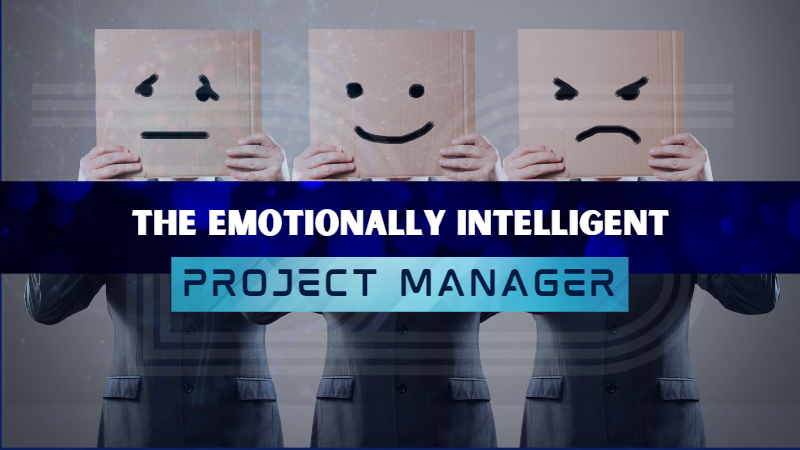
by Dharam CW2 | May 19, 2023 | General
Emotional intelligence in the workplace is becoming increasingly important for leaders and project managers as remote work became more prevalent due to the pandemic. Success in project management and managing cross-functional remote teams is only possible with emotional intelligence.
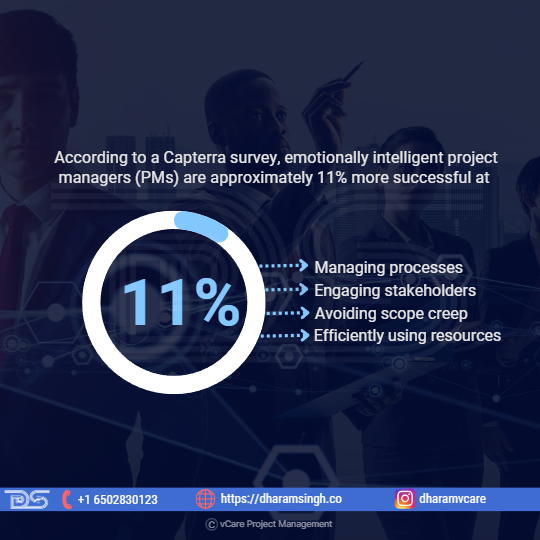
Capterra Survey
According to a Capterra survey, emotionally intelligent project managers (PMs) are approximately 11% more successful at managing processes, engaging stakeholders, avoiding scope creep, and efficiently using resources than PMs who lack this skill.
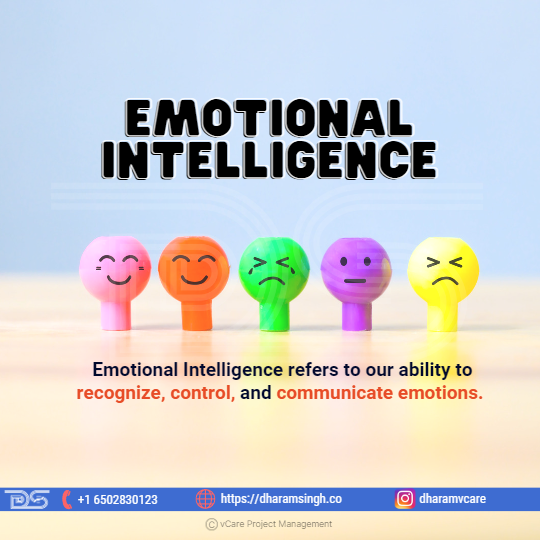
Emotional Intelligence
What is Emotional Intelligence?
Emotional intelligence refers to our ability to recognize, control, and communicate emotions. People with high emotional intelligence understand how they feel, what their feelings imply, and how their feelings affect others. In interpersonal situations, it is also the ability to empathize with others. Emotional intelligence is about creating a positive work environment, which is critical to the success of any project.
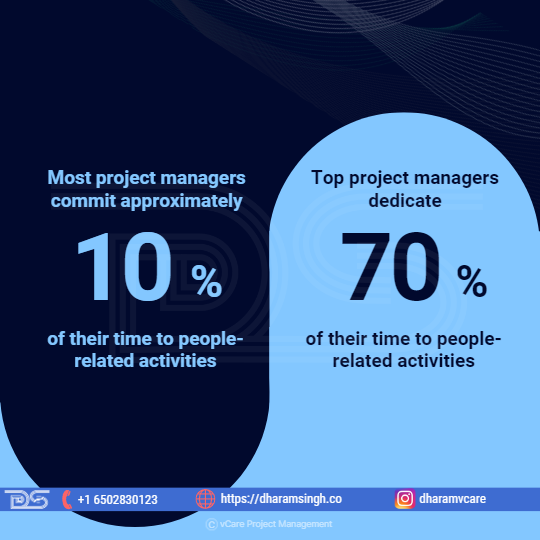
As Per LiquidPlanner Study
According to a LiquidPlanner study, most project managers commit approximately 10% of their time to people-related activities. Top project managers dedicate 70% of their time to these activities. As a result, we can conclude that emotional intelligence is crucial for project success.
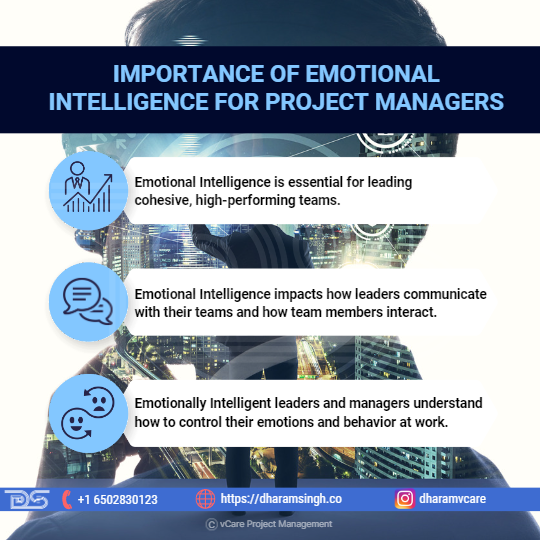
Importance of Emotional Intelligence for Project Managers
Importance of Emotional Intelligence for Project Managers
- Emotional intelligence is essential for leading cohesive, high-performing teams.
- According to researchers and behavioral scientists, Emotional intelligence impacts how leaders communicate with their teams and how team members interact.
- Emotionally intelligent leaders and managers understand how to control their emotions and behavior at work, which includes providing safe environments for exchanging ideas and feedback, productive teamwork and performance, good morale, employee engagement, and job satisfaction. They manage workplace stress and conflict with care and educate their team members to do the same.
Characteristics of Emotional Intelligence
What can project managers do to help themselves develop and become more aware? First, let’s examine five abilities for raising emotional intelligence:
- Self-Awareness – The ability to sense, identify, and comprehend emotions is self-awareness. Unfortunately, many of us were taught to ignore our emotions in the past. However, it is critical to be aware of your feelings to make appropriate decisions and act accordingly. Those with high self-awareness are self-assured, authentic, open to feedback, and capable of maintaining perspective throughout all project phases.
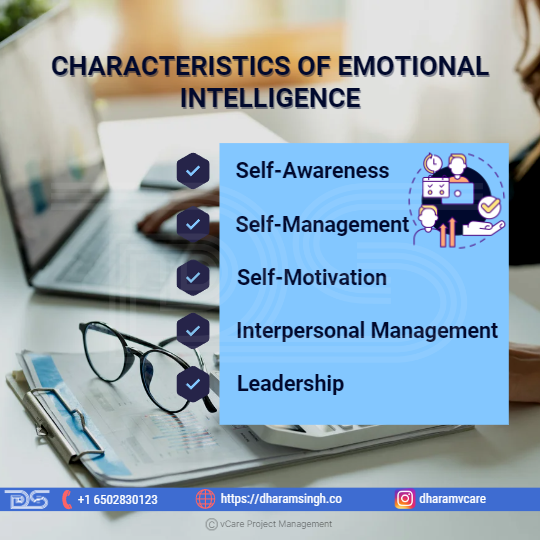
Characteristics of Emotional Intelligence
- Self-Management – Self-management is the ability to reason well while understanding feelings. Many frequently react based on their frame of reference rather than selecting a response based on their current unique circumstances. Self-managers are deliberate in decision-making, taking the initiative, framing events appropriately, maintaining perspective, and responding quickly. They understand their feelings and why they have them and effectively manage their responses.
- Self-Motivation – Self-motivation is the ability to channel the power of your emotions toward a specific goal. When project teams have a purpose, these ‘P’s follow peace, passion, power, perspective, and potential leverage. Self-motivators who are influential are optimistic and have a positive attitude. They can delay gratification and assert themselves.
- Interpersonal Management – The capability to identify and respond properly to the emotions of others is referred to as interpersonal management. If you can connect with people and acknowledge their humanity, they will answer openly, leading to common trust.
- Leadership – An emotionally intelligent project manager inspires guides, challenges, and supports the team. Leadership is defined as the ability to create and communicate vision and passion for assisting individuals and organizations in reaching their full potential.
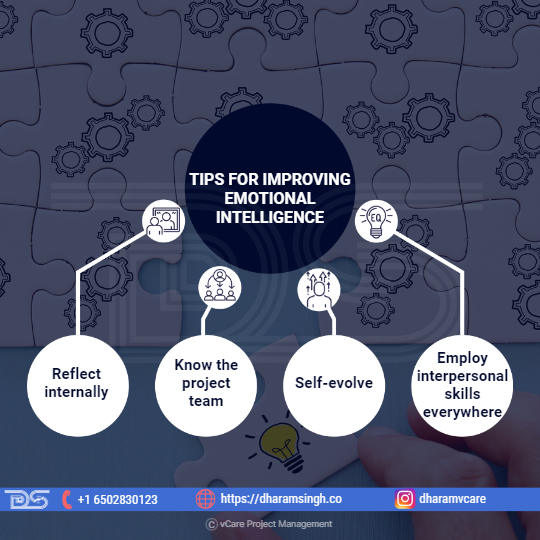
Tips for improving Emotional Intelligence
Tips for improving Emotional Intelligence
- Reflect internally – To become more emotionally aware, one must first understand their emotions and then regulate them in stressful situations. Next, they have to figure out what motivates them. Finally, authenticity is necessary to develop emotional intelligence by leading a successful project team and establishing meaningful relationships with stakeholders.
- Know the project team – Project managers are usually aware of the people they must contact when working on a project. However, understanding the project team, from team dynamics to personalities to dealing with conflict and stress, is just as important. To improve emotional intelligence, one must first get to know their team, communicate with them, and understand their emotions. It will also help the success of their project. This job becomes even more important for teams that operate in multiple locations and are diverse.
- Self-evolve – Along with other important leadership talents, project managers should work to improve their emotional intelligence regularly. Conditions surrounding a project frequently change; its scope may shift, the number of stakeholders may increase, and projects may eventually end.Every project is distinct, and no project manager can complete a project independently. Therefore, it is advantageous for project managers to consider what they learn during and after a project. For example, consider how a project team operated, what they witnessed during critical times with stakeholders, and their team’s performance.
- Employ interpersonal skills everywhere – Emotional intelligence can be helpful in almost any project management situation. For example, people may feel compelled to sign off on a strategy to minimize delays while managing scope changes or project risk. Following the resolution of such issues, an emotionally intelligent project manager would pursue people because they notice that this could lead to more severe problems in the future.
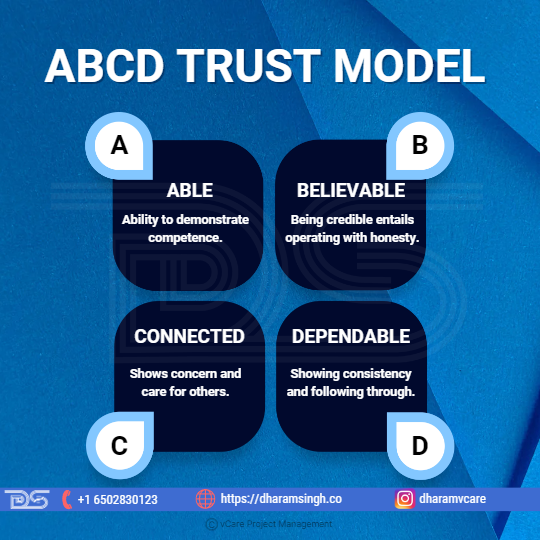
ABCD Trust model
ABCD Trust model
Better relationships will result in better outcomes. That is why developing trusted connections is critical to the success of your organization. When individuals trust one another, they may work efficiently together.
It is well known that low trust harms morale, productivity, and turnover. To prevent these traps, Ken Blanchard created the ABCD Trust Model to help executives understand the activities that affect creating trustworthy relationships.
Blanchard suggests four critical aspects for leaders to develop trust with people: Able, Believable, Connected, and Dependable.
- Able – The term able refers to the ability to demonstrate competence. Leaders demonstrate competence by possessing the necessary skills, education, credentials, and experience. They also exhibit their capacity to lead by accomplishing achievements. Able leaders can encourage people and collaborate with them to achieve goals.
- Believable – Being credible entails operating with honesty. Believable leaders adhere to a set of core beliefs. They know what they stand for and will not compromise their principles under pressure. Being credible also means maintaining promises and not lying or stretching the truth.
- Connected – Connected shows concern and care for others. This aspect fosters trust and contributes to a more engaged workplace atmosphere. Being linked entails attending to people’s needs and promoting their well-being. Leaders also build relationships by giving information not only about the organization but also about themselves. Employees are significantly more likely to provide their best effort when they feel linked to leaders.
- Dependable – Dependable means showing consistency and following through. It entails holding oneself and others accountable for commitments. A trustworthy leader will accept responsibility for their acts and help their followers face adversity.
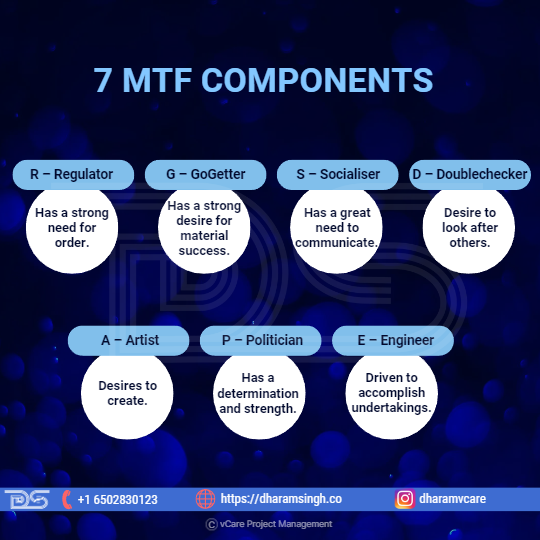
7MTF Components
7MTF Components
The 7MTF model is composed of seven components. We all have all 7 in our personalities; as adults, 2 to 4 will be strong, some will be weak, and others will be ordinary. This mix of elements is one of the most significant variables in deciding our temperament – our emotional predisposition.
- The R – Regulator (formerly known as the Normal) – A person with a ‘strong R’ has a strong need for Order. They will be mature, responsible, calm, and emotionless. You may hear the words ‘should,’ ‘ought,’ and ‘logical’ in their language. They have high expectations of themselves and others, including those with whom they live and work.
- The G – GoGetter (formerly known as the Hustler) – A person with a ‘strong G’ has a strong desire for material success. This individual entails enjoying money and the things it can purchase. The G is quick, opportunistic, intelligent, enterprising, and charming. They are short-term in nature, expecting results immediately or very soon. Promising a G a large monetary reward next year is unlikely to pique their attention.
- The S – Socialiser (formerly known as the Mover) – The ‘strong S’ personality has a great need to communicate. This aspect implies talking about people, fun, events, what you did over the weekend, or anything related to life. Hence, their straightforward, friendly, and frequent grin immediately.
- The D – Doublechecker – The ‘strong D’ is characterized by a desire to look after others and ensure everyone is safe. When you encounter a strong D, expect someone obedient, loyal, and concerned with doing the right thing. One of their greatest assets is their ability to anticipate difficulties and hazards.
- The A – Artist – A person with a ‘strong A’ desires to create. “I want to be different,” is what they would say. These hardworking individuals are conscientious and do not wish to offend anyone. Seek for anything unusual about their attire, such as innovative earrings, cufflinks, a six-button jacket, or an all-black ensemble!
- The P – Politician – A solid handshake and direct eye contact indicate that the ‘strong P’ is determined to win. This person has a determination and strength that others may find challenging. The spoken word is the strong P’s stock in trade – look for status markers like the huge Mercedes in metallic blue.
- The E – Engineer – A person with a ‘strong E’ personality is driven to accomplish undertakings. The strong E has traits such as process, detail, and procedure. This individual can form a strategy and make it happen as soon as they see anything. The E is concerned with completion. So, unless you can assist, you should avoid getting in the way!
Wisdom – strive for mental stability and individual resilience – 10 Competencies
Wikipedia defines wisdom as the “ability to contemplate and act using knowledge, experience, understanding, common sense, and insight.” Psychologists have created a list of ten competencies that are typical therapies in their field and are referred to as wisdom. Self-awareness, self-control, and empathy are the three components of emotional intelligence (EI). Although the fourth component of EI is not formally mentioned among the ten competencies, social influence or influencing others may be considered a result of being highly effective in the other areas.
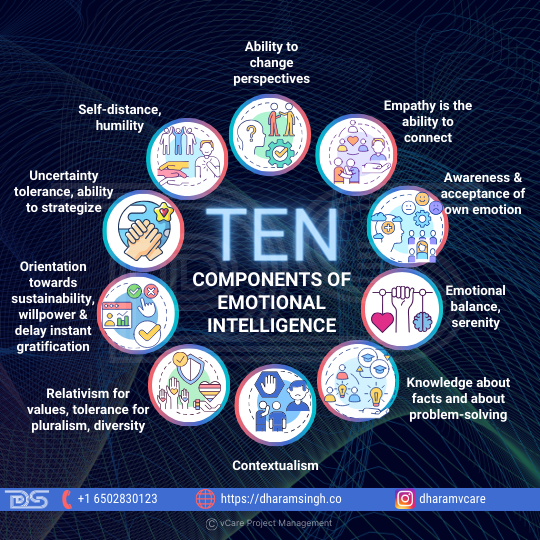
Ten Components of Emotional Intelligence
- Ability to change perspectives – In a bipolar environment, it is possible to remain trapped in one thought and dislike the other viewpoint with strong emotions, which may lead to violence. The ability to look for and identify more points of view implies a shift in viewpoint. Some of the therapies used to treat mental illnesses can help with this. Examples include role-playing, acting, visiting people in various countries, learning about diverse cultures, and brainstorming.
- Empathy is the ability to connect – Understanding people’s intentions, current state of mind, emotions, and mindsets is necessary for being heard, establishing trust, and influencing others. In addition, active listening techniques may help you focus outside yourself and view others as humans who vary from ourselves.
- Awareness & acceptance of own emotions (self-awareness) – Self-awareness leads to increased self-confidence and sincerity. It refers to mindfulness, or being aware of one’s feelings, and is required for self-control and emotional balance.
- Emotional balance, serenity (self-control) – Patience, serenity, and avoiding knee-jerk reactions make you more popular and respected and contribute to mental tranquility. Having a mentor can help you develop and fine-tune this skill.
- Knowledge about facts (know what, assimilation) and about problem-solving (know-how, accommodation) – Wisdom includes knowledge; therefore, it has two components.
- On the one hand, we have factual knowledge about a topic; on the other, we may be specialists in a (typically technical) area. This heuristic knowledge and assimilation are how we apply established systems to circumstances.
- On the other hand, when we encounter new situations or topics, we use accommodation to apply our problem-solving skills. We employ our epistemic intelligence and heuristics to do this.
- Contextualism (consider the situation, timeline, and social relevance) – Even though we have theories and may find similarities in new scenarios, each situation is unique and depends on the circumstances, the context in which the problem develops, and the societal importance. This capacity is achieved via awareness and avoiding picking a solution that works in another context without first examining the present dependencies of the situation.
- Relativism for values, tolerance for pluralism, diversity (which is hard if you are part of the same belief systems for most of your life, like nations and churches) – There are many truths (this is known as non-monism), and yours is only one of them. Others have the right to their realities, which are based on the cultures in which they live, their beliefs and experiences, and the facts to which they have access. Value relativism allows one to accept and appreciate the values of others.
- Orientation towards sustainability, willpower, and delay instant gratification (perspective of linear and circular time flow) – We can pursue long-term goals and make decisions with both short and long-term consequences in mind.
- Uncertainty tolerance, ability to strategize (imaging solutions for scenarios) – Accept that life is unpredictable and swim through it like a river, adapting to currents and waves as they come.
- Self-distance, humility – Do not believe you are the center of the universe, which will remain when you die. Avoid being a taker rather than a giver by avoiding jealousy, bragging, pride, and greed.
Final Thoughts
For today’s project managers, emotional intelligence is a critical concept. Many companies are looking for project managers with strong technical and soft skills. Emotional intelligence is crucial in project management because it enables project managers to improve communication and collaboration in the workplace. It is essential to mention that emotional intelligence can be imparted and nurtured. This aspect implies that as a project manager, one can better oneself by controlling feelings and emotions and developing positive behaviors to influence others at work. One will make better decisions about other people’s emotions, strengths, and weaknesses once they have recognized their thoughts.
Feel free to check out my discussion on this topic with Thomas Walenta in YouTube
For any questions related to your Project Management career, training, and certifications, you can book an obligation free 15 minutes session with me by visiting http://talktodharam.com/
You can subscribe to the vCare Project Management YouTube Channel to catch future videos of our Q&A series and certification success stories: https://bit.ly/2YF0wJl
You can subscribe to and follow my podcasts and interviews with Project Management Experts on YouTube at https://bit.ly/2NDY8wd
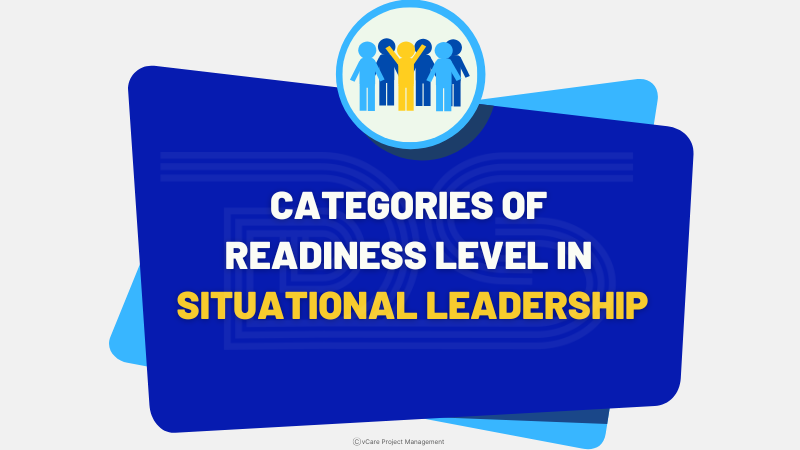

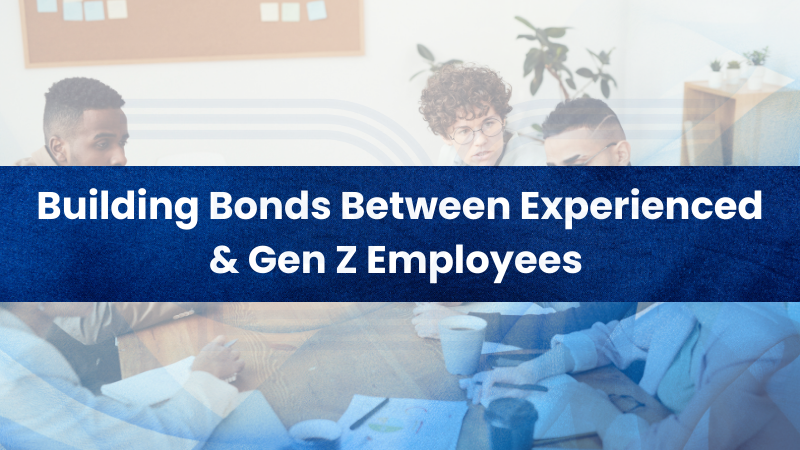
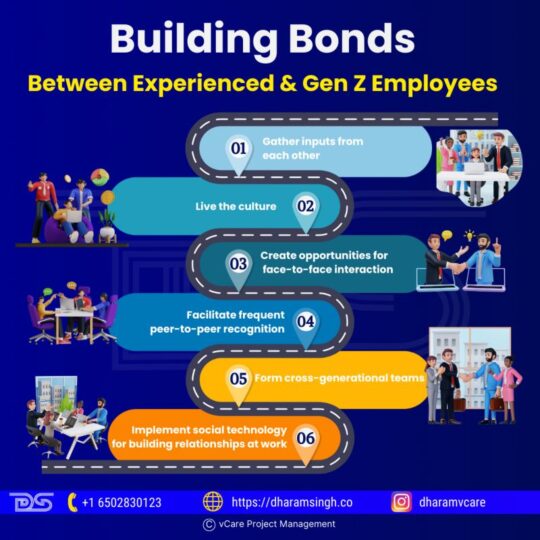

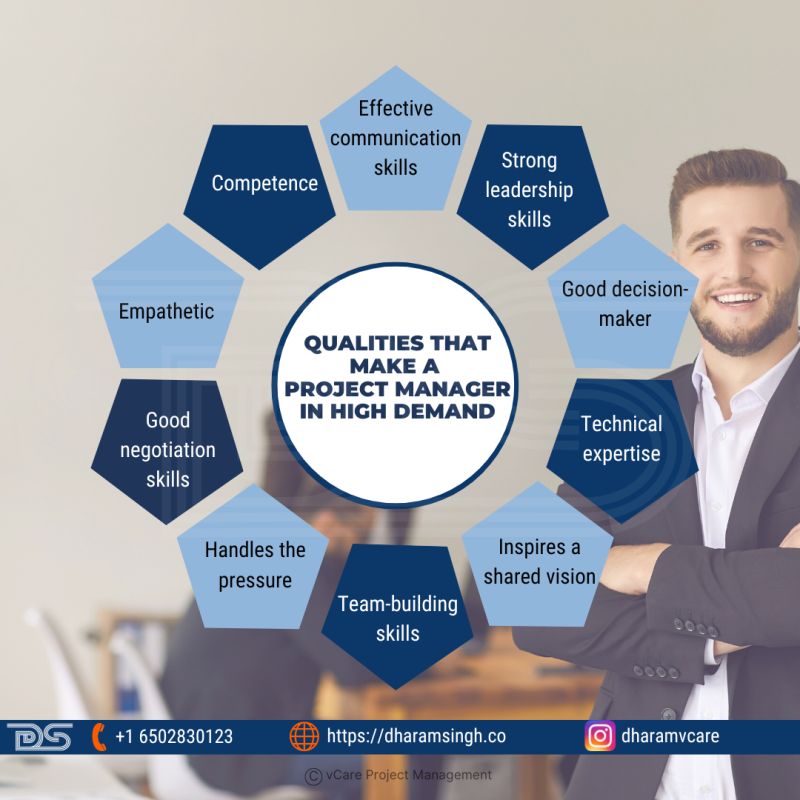
















In today’s competitive landscape, project management is a complex role that demands a unique blend of skills. To excel in this field, one must possess a combination of effective communication, strong leadership, good decision-making abilities, technical expertise, the ability to inspire a shared vision, adept team-building skills, the capability to handle pressure, good negotiation skills, empathy, and overall competence.
These qualities set a project manager apart and contribute to successful project outcomes.